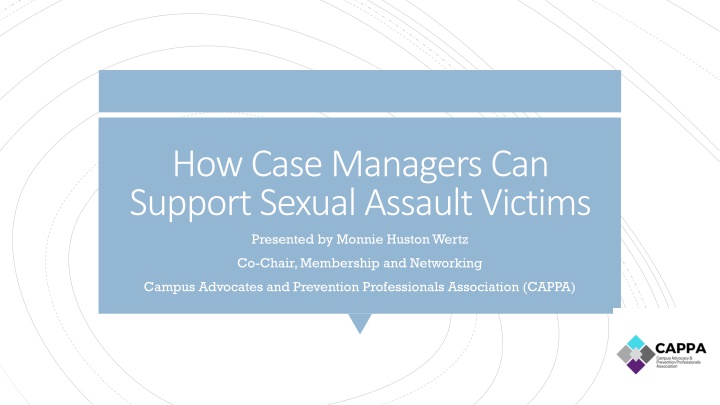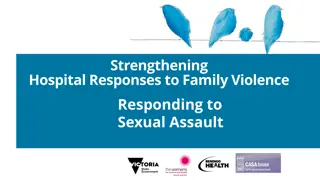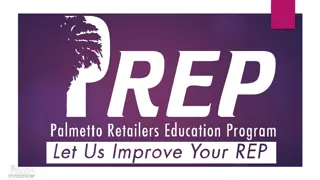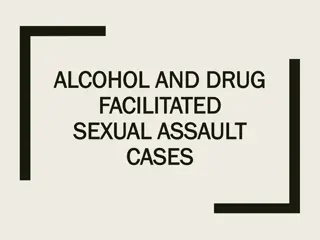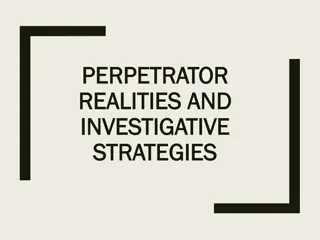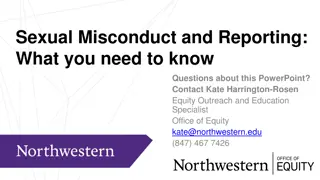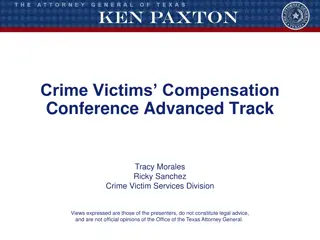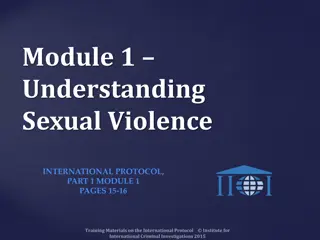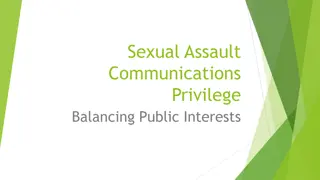Supporting Sexual Assault Victims: Case Managers' Role
Case managers play a crucial role in supporting sexual assault victims by providing a safe place, utilizing therapeutic tools, and understanding cultural contexts. They need to be familiar with trauma-informed care, empower students, and address barriers to resource utilization. With continued training and collaborative efforts, case managers can effectively assist victims in navigating their experiences and healing journey.
Download Presentation

Please find below an Image/Link to download the presentation.
The content on the website is provided AS IS for your information and personal use only. It may not be sold, licensed, or shared on other websites without obtaining consent from the author.If you encounter any issues during the download, it is possible that the publisher has removed the file from their server.
You are allowed to download the files provided on this website for personal or commercial use, subject to the condition that they are used lawfully. All files are the property of their respective owners.
The content on the website is provided AS IS for your information and personal use only. It may not be sold, licensed, or shared on other websites without obtaining consent from the author.
E N D
Presentation Transcript
How Case Managers Can Support Sexual Assault Victims Presented by Monnie Huston Wertz Co-Chair, Membership and Networking Campus Advocates and Prevention Professionals Association (CAPPA)
CASE MANAGEMENT University of Miami in 2000 VA Tech 2007 Founding of HECMA 2008 Emerging Fields VICTIM ADVOCACY Grassroots work around SA and IPV out of the women s movement Recognition of SA and IPV in collegiate communities early 1990s/Title IX resurgence in 2011 Founding of CAPPA 2015
AGENDA 1. Discussion of CM experience with student SA /IPV 2. Introduction of best practice suggestions from CAPPA 3. Suggestions on working together in the future
Cultural context Lack of support family, peers, institutions Failure to identify or name experience Things affecting student disclosures Fear of punishment or retribution Avoidance Recent #MeToo movement Passage of time
Case Manager Experiences What are you seeing in your practice?
Providing a Safe Place Familiarity with a Number of Therapeutic Tools and Models Psychoeducation for the Student Best practice suggestions View Symptoms as Possible Adaptations Recognize Barriers to Resource Utilization Employ Trauma Informed Care Each Student Will Be Different!
Most students are reluctant to disclose to anyone Students need a place where they can be empowered work collaboratively, as to not overwhelm Safe physical spaces are as important as emotional spaces Providing a Safe Place
Many methods have been suggested and utilized (i.e. exposure therapy, CBT, group therapy, dual representation) Continued training is critical, particularly in trauma informed care Familiarity with Therapeutic Tools and Models
Psychoeducation for the student Students may not have a vocabulary for what has happened or want to identify Incident may have been framed in negative ways by loved ones Basic definitions and common responses are key Understanding the role of AOD in assault and recovery
View Symptoms as Possible Adaptation Many survivors will not disclose immediately PTSD is very common and presents in many ways Pre-existing mental health issues/AOD issues may be exacerbated by trauma
Prior usage of mental health services is greatest predictor of help seeking Cultural issues may work against seeking assistance Also lack of finances, risk to reputation, family support Recognize barriers to resource utilization Intentional partnerships will help facilitate
Managing the Initial Disclosure Understanding Trauma and Its Impact Educating Student Clients on Trauma Providing Trauma Informed Care Promoting Safety Cultural Competence Supporting Choice, Control, and Independence Audit Your Own Programs and Practice
SAFE, NON-BLAMING ENVIRONMENT Importance of initial disclosure What happened to you? rather than What is wrong with you? Recognize social stigma and your own biases Understand your own reporting requirements and disclose those to the student clearly Managing the Initial Disclosure EACH STUDENT WILL BE DIFFERENT! Be prepared for seemingly incongruent behaviors Ask open ended questions, allowing for longer than normal responses Avoid directives/commands Strive for cultural competence
Voices of Experience What would you share with other collegiate case managers as best practices?
Questions/Comments? Contact me at mhwertz@ut.edu for handout or summary of research
